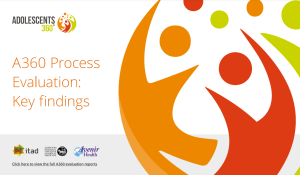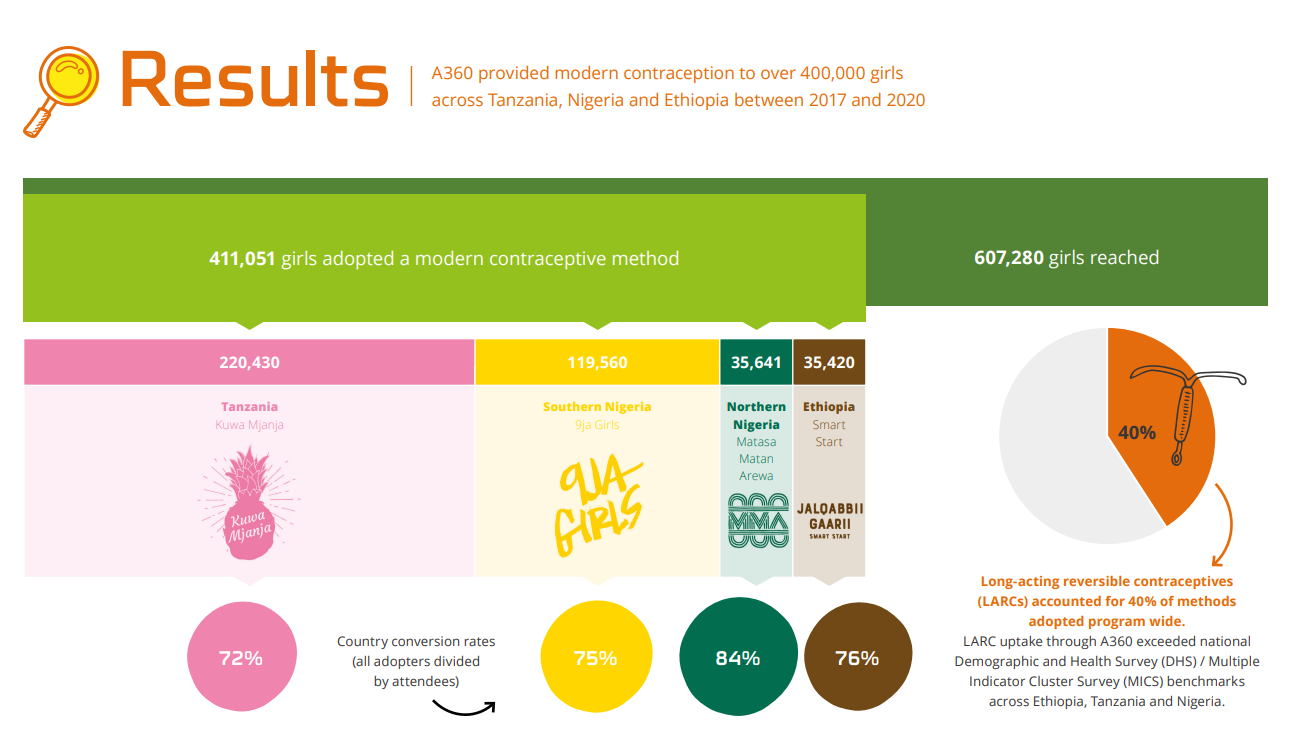Global health priority
Reaching adolescent girls with modern contraception is a global health priority. Complications during pregnancy and childbirth are a leading cause of death among girls across the world.
Adolescent pregnancy increases the risk of neonatal mortality and decreases girls’ earning potential by up to 30% over their lifetimes. High adolescent fertility also results in significant economic losses – for example a 2013 study by UNFPA found that girls in Tanzania dropping out of school due to pregnancy cost around US$5.2 billion a year.
The Adolescents 360 programme and our role
The Adolescents 360 programme (A360) was a four-year, US$31 million initiative designed to find innovative and creative solutions to this global problem, beginning with Ethiopia, Kenya, Nigeria and Tanzania.
A360 was implemented by Population Services International (PSI) in partnership with IDEO.org, the Center on the Developing Adolescent at UC Berkeley, and the Society for Family Health Nigeria.
From 2016 to 2020, we worked in collaboration with the London School of Hygiene and Tropical Medicine (LSHTM) and Avenir Health to independently evaluate and distil lessons from the A360 programme.
The evaluation was commissioned by A360 funders; the Bill and Melinda Gates Foundation, and Children’s Investment Fund Foundation.
Catalysing more effective programming

Our work generated vital insights and inspired new ways of working that helped improve the programme and inform the design of its second phase. This was achieved, in particular, through the Itad-led process evaluation.
The process evaluation involved annual rounds of data collection, with findings presented back to the implementers regularly to help feed lessons into the programme. This involved a huge amount of engagement and collaboration between A360 and Itad over four years, which helped build strong relationships and a deep understanding within the evaluation team of A360 contexts, perspectives and challenges.
“We found insights generated through the process evaluation to be immensely valuable in informing project adaptation and strategic shifts…we believe the process evaluation added tremendous value to our evidence-based adaptation processes within the first A360 investment.” – PSI, commenting on the process evaluation in their November 2022 management response
This impact would not have been possible without a strong partnership with the A360 implementing teams, who were open and committed to learning every step of the way. A360 was designed to be an adaptive programme, which helped teams protect the time and space to engage with findings, and helped foster a mindset of curiosity around how to do things better. The trusting relationship developed through the process evaluation also created the space for Itad and A360 teams to have constructive conversations over challenging findings where necessary, and collectively identify lessons that were useful and actionable.
In 2018, A360 used the findings of our mid-term evaluation to significantly shape the direction of the programme. Our review found that the focus on ‘speed and scale’ in the early stages of the programme had distracted attention away from critical components of the interventions that were necessary for sustainability – in particular components that focused on building an enabling environment for girls to access contraceptives. This helped A360 place a renewed focus on these central considerations in the final years of the programme – expanding and deepening empowerment components, and working towards sustainability within government health systems.
Reflecting on programme learnings since the 2018 mid-term evaluation, PSI said: ‘The 2018 mid-term evaluation informed, and A360’s external evaluation findings continue to guide, the necessary adaptations that keep A360 on track, delivering transformative contraceptive programming, with and for the girls and health systems the project serves’.
Participatory learning for course correction
Over the course of the evaluation, we adapted and improved our ways of working to make our findings increasingly useful to A360. This included introducing participatory action research case studies, which were co-designed with A360 teams and aimed to unpack their ‘burning questions’ in order to feed insights into future planning.
We also introduced participatory ‘sounding workshops’, which gave a dedicated space for evaluators to present findings back, and implementing teams to review and digest them and consider how to build them into their ways of working.
The sounding workshops directly helped to inform programme course-corrections. For example, the evaluation found that the programme was proving onerous for over-burdened health workers in Ethiopia – and in response A360 simplified the implementation tools and started working with a cadre of volunteers to provide additional support. This proved a huge success and has been made a key part of the second phase of the programme.
Matthew Wilson, A360 Project Director, PSI, commented: ‘The external evaluation generated a wealth of learning that goes well beyond the effectiveness of the interventions…we’ve already started applying this learning…It has informed course corrections during the first phase of A360 and the design of the second phase of A360’.
Building skills to support social and behaviour change at the intersections
 Interest in the A360 evaluation and methodology continues, especially at the intersection of sexual and reproductive health and rights (SRHR) and human-centred design (HCD). In December 2022, we co-presented a session at the International SBCC Summit on ‘Strategies for Evaluating Human-Centered Design: Methods, cross-disciplinary collaboration and data use’. There was strong interest and participation in this skills-building session including from representatives from other implementing agencies, donors and evaluators.
Interest in the A360 evaluation and methodology continues, especially at the intersection of sexual and reproductive health and rights (SRHR) and human-centred design (HCD). In December 2022, we co-presented a session at the International SBCC Summit on ‘Strategies for Evaluating Human-Centered Design: Methods, cross-disciplinary collaboration and data use’. There was strong interest and participation in this skills-building session including from representatives from other implementing agencies, donors and evaluators.
Where next?
We are delighted to have been commissioned as an evaluation and learning partner on the second phase of A360, to continue to provide support and insights to PSI as A360 continues its journey. Together we look forward to helping transform the lives of adolescent girls in Ethiopia, Nigeria, Kenya and Tanzania – and ultimately their societies.


